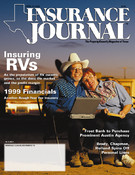Q. We have a customer who was involved in a not-at-fault auto accident that included both bodily injury and extensive vehicle damage. An agreement on the amount of vehicle damage has been determined, but the adjuster said they would not pay for the vehicle damage until the bodily injury claim was settled. Is this correct?
A. No, under Subchapter C. Unfair Claims Settlement Practices of the Texas Administrative code, it states under 21.203 “No insurer shall engage in unfair claims settlement practices. Unfair claims settlement practices means committing or performing any of the following: (8) not attempting in good faith to settle promptly claims where liability has become reasonably clear under one portion of the policy in order to influence settlement under other portions of the policy coverage. (This provision does not apply to those situations where payment under one portion of coverage constitutes evidence of liability under another portion of coverage).”
Q. One of our insureds has hired a nanny who will be taking the insured’s children to and from school each day. The nanny will be using her own vehicle. What would happen if she was involved in an accident and our insured was sued?
A First, you should advise your insured to require the nanny to furnish proof of liability insurance on her own vehicle. Her liability insurance will provide primary protection for her employer (your insured) if they are sued, under covered person part three. “For your covered auto, any person or organization but only with respect to legal responsibility for acts or omissions of a person for whom coverage is afforded under this Part.”
Q. If the nanny has no liability, or if the coverage is insufficient, your insured’s policy will respond. Your insured’s Personal Automobile Policy says it will pay for damages for bodily injury or property damage for which any covered person becomes legally responsible because of an auto accident. The policy goes on to define covered person as the named insured for the ownership, maintenance, or “use” of any auto or trailer.
A. In this case the nanny is transporting the insured’s children and that would constitute “use” of her car by your insured. So, your insured could turn to his or her policy for coverage of any liability for which he or she is held liable.
Q. We had a carrier deny a first party property claim and they only notified the agency. The carrier told us it was our responsibility to tell our insured. We really don’t like being put in the position of denying claims and think the carrier should do this. Is the carrier correct?
A. No, the carrier is required to notify the insured. Article 21.55 of the Texas Insurance Code, Prompt Payment of Claims in Sec. 3 states “an insurer shall notify a claimant in writing of the acceptance or rejection of the claim not later than the 15th business day after the date the insurer receives all items, statements and forms required by the insurer, in order to secure final proof of loss.” The statute for prompt payment of claims only applies to first party claims.
Was this article valuable?
Here are more articles you may enjoy.


 Chubb CEO Greenberg on Personal Insurance Affordability and Data Centers
Chubb CEO Greenberg on Personal Insurance Affordability and Data Centers  Insurify Starts App With ChatGPT to Allow Consumers to Shop for Insurance
Insurify Starts App With ChatGPT to Allow Consumers to Shop for Insurance  Allstate CEO Wilson Takes on Affordability Issue During Earnings Call
Allstate CEO Wilson Takes on Affordability Issue During Earnings Call  US Appeals Court Rejects Challenge to Trump’s Efforts to Ban DEI
US Appeals Court Rejects Challenge to Trump’s Efforts to Ban DEI 


